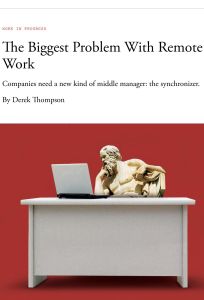Join getAbstract to access the summary!

Join getAbstract to access the summary!
Derek Thompson
The biggest problem with remote work
Companies need a new kind of middle manager: The synchronizer.
The Atlantic, 2022
What's inside?
Remote work can work for you if you have a “synchronizer” to address its weaknesses.
Recommendation
Companies must now address remote work’s weaknesses, particularly regarding teams, innovation and onboarding new employees. As bestselling author Derek Thompson reports in The Atlantic, Zoom and Slack are sound tools, but cannot provide the spontaneity and trust-building intimacy that helps people collaborate and innovate. In the 19th century, companies created the middle manager position to facilitate industrial expansion. Today, Thompson argues, the hybrid model calls for the development of its own manager, a “synchronizer,” to coordinate who should be in the office and when, and what they should do there. Thompson suggests that synchronizers will be essential to maintaining a healthy hybrid work culture – which he regards as the certain future of work.
Summary
About the Author
The Atlantic staff writer Derek Thompson wrote the bestseller Hit Makers: How to Succeed in an Age of Distraction and Hit Makers: How Things Become Popular.


























Comment on this summary